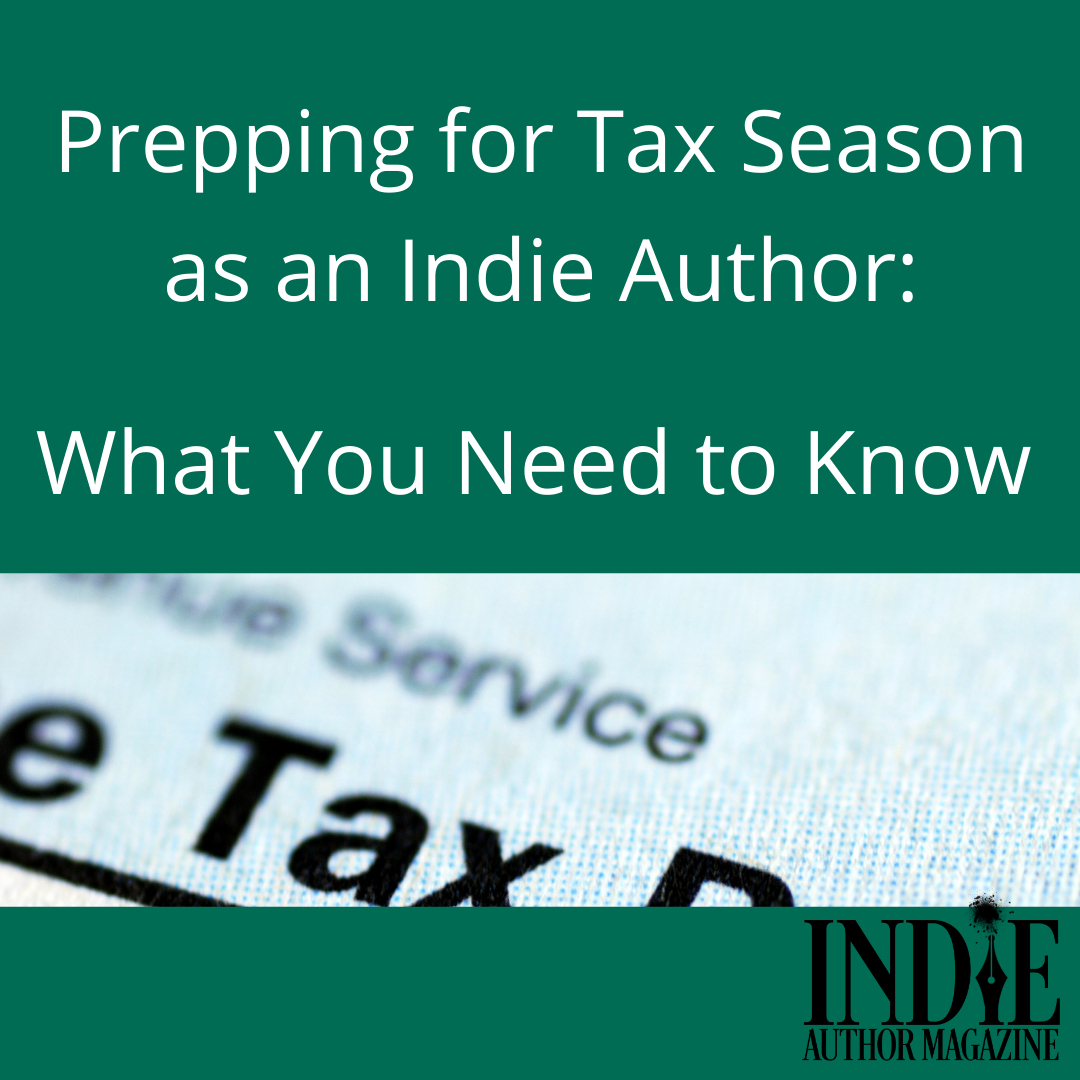Tax season is rapidly approaching for those of us in the US, and whether you’re full-time or just starting to see sales, if you made money from your books last year, it has the potential to be complicated. Although we’re not qualified to give direct financial advice regarding paying taxes as an indie author, IAM has a few tips about preparing for tax season that should help anyone who needs to pay taxes in the US this year. In this article, we’ll touch on the forms and paperwork you need to compile, applicable deadlines, and some additional tips to make the process flow as smoothly as possible.
Note: If you live outside the US, your country’s tax laws and requirements likely differ from those described in this article. Additionally, the following information cannot be considered direct financial advice and is meant for general education purposes only. For advice and information regarding your specific financial situation, contact a CPA or accountant who understands the federal and state laws that will apply to you.
Know your Entity
One of the most important factors to understand as you prepare for tax season is your business structure—how your taxable income flows through to your personal tax return. If you haven’t legally filed to become an LLC, a partnership, an S corporation, or a C corporation, then you’ll be filing as a sole proprietor. For more on LLCs, read guest author Joe Solari’s breakdown of various business structures from the October 2022 issue.
Even if you have a regular job collecting a W-2, you’ll need to file additional income from your author business with a Schedule C form. For federal taxes, this applies universally, but each state may have additional requirements. Hiring a professional firm or individual tax professional or purchasing a highly rated, reputable tax software can help guide you through the intricacies of dealing with the IRS. In the long run, ensuring that all your i’s are dotted and t’s are crossed is worth the peace of mind that comes with properly satisfying your tax liabilities.
Sole proprietor
As a sole proprietor, you will use Schedule C to report business income and expenses. You are responsible for paying self-employment taxes, including Social Security and Medicare.
Partnerships and corporations
Partnerships and corporations are typically set up with the assistance of a business or tax attorney. If this is a step you’ve taken, then that professional should also assist with tax preparation and filing or should recommend another professional to assist you.
Partnerships: A partnership must file an information return but typically does not pay federal income tax. If you have a business partner, you will likely file as a partnership or corporation and use an information return to report certain business transactions to the IRS. Usually, Form K-1 reports an individual’s share of partnership and S corporation income.
C corporations: Unlike a sole proprietorship or a partnership, for federal tax purposes, a C corporation is recognized as a separate tax-paying entity. This means the corporation may take special deductions. Still, it also means the profit earned is taxed at the corporate level, then again on your individual tax return if it is distributed as a dividend.
S corporations: An S corporation is similar to a partnership in that the income typically flows through to your individual tax return. But you usually set a salary, withholding payroll taxes at the corporate level for the owner (you). Some or all of your income may be reported to you on a Form W-2 at the end of the year. One advantage of being an S corporation is your ability to choose a salary, subject to reasonable guidelines. However, there can be severe ramifications if you underpay yourself when your business makes money because wages are subject to payroll taxes.
LLCs: An LLC is a legal business structure. However, it is a state-level designation and not generally recognized for federal tax purposes. An LLC must be filed as a corporation, partnership, or sole proprietorship.
Next Steps and Tax Prep
During the year, you may need to file estimated taxes for your business. According to the IRS, “Individuals, including sole proprietors, partners, and S corporation shareholders, generally have to make estimated tax payments if they expect to owe tax of $1,000 or more when their return is filed. Corporations generally have to make estimated tax payments if they expect to owe tax of $500 or more when their return is filed. You may have to pay estimated tax for the current year if your tax was more than zero in the prior year. See the worksheet in Form 1040-ES, Estimated Tax for Individuals, for more details on who must pay estimated tax.”
Once you understand your business structure, you can take the steps to maximize tax deductions. One of the first steps to take is to secure a tax ID number.
Tax IDs are free and can be obtained through the IRS’s website, https://irs.gov/businesses/small-businesses-self-employed/employer-id-numbers. It’s a good idea as a sole proprietor to get a separate tax ID number for your business to give to clients or other entities who require a W-9 form. It is also a requirement if you have employees. If you’ve formed a partnership or corporation, this should have been done during that process, so check with the professional who assisted you with the setup and filing for your entity.
To make life easier as a US taxpayer, keeping track of the money you earn and the money you spend should be part of your daily, or at least weekly, routine. As you prepare for this year’s taxes, you may be organized, or you might need a little more time to get all your information together. If you receive royalties from a publisher (traditional or self-published), you should receive a tax form stating your earnings either by email or standard mail, depending on your selection during the time you published your work. If you haven’t received those yet, write to the entity who published your work and ask for it. Usually it is a Form 1099. If you sell directly, the payment processor you use should be able to generate a report of earnings from January 1 to December 31.
Pro Tip: Don’t forget, you can deduct the processing fees you pay if you sell direct and your payment processor keeps a percentage.
When filing, all your numbers will be grouped into categories. You won’t have to enter specifics for most deductions as long as the amount entered ads up to the total amount of receipts. Always consult a tax professional, but a best practice is to keep all receipts for at least seven years. If you get audited, having an organized tracking system—whether it’s digital or paper receipts in categorized shoe boxes—is the best way to avoid heartburn.
Pro Tip: If you don’t have a system in place, using a personal finance tool like Mint.com, QuickBooks, or other financial trackers throughout 2024 can help you categorize and keep track of your business and personal income and expenses separately.
Make the most of tax deductions
When making your list of deductions, think of all the things purchased during the year for your author business. If you can carve out a little nook in your home to dedicate solely to the business of writing, you can claim a significant home office tax deduction. It does not have to be a separate room. Something as simple as a desk in the corner of the kitchen, living room, bedroom, or other space will qualify. The stipulation is that it must be used exclusively for business tasks.
Use the list of examples below to jumpstart your tracking, but always consult with a tax professional to ensure deductions are accounted for properly:
- Office supplies
- Reference materials—include any books, fiction or nonfiction, you purchase for genre or story research
- Travel expenses
- Conference/workshop fees
- Cover designs
- Website/newsletter expenses
- Design services
- Advertising/marketing
- Promotional expenses
- Postage
- Subscriptions (KU, Audible, IAM, Book Brush, Canva, Adobe, etc.)
- Promotional merchandise
This list of deductible items is quite large, but meticulous bookkeeping and receipt filing is necessary to satisfy IRS rules.
In addition to income taxes, you may be required to collect and pay sales tax on physical products. Sales tax varies from state to state, so check your state’s guidelines to see if you should be charging customers sales tax for your physical products like books or other merchandise. If you should have collected taxes and didn’t, you can be personally liable for the sales tax you should have collected. Check with your tax professional to ensure proper filing on sales of physical products.
Finally, if you have employees on your payroll, including yourself, you and they must pay the standard payroll tax on income. We said it in the beginning, but it should be reiterated that employing the services of a tax expert matched to your unique situation is a best practice that should be part of your author business—and yes, you can deduct this year’s tax prep expenses on next year’s return. An expert can uncover industry-specific deductions for more tax breaks and file your taxes, giving you the peace of mind you need to continue writing and creating freely.
If you need assistance finding forms or experts to help prepare your taxes, use the links below to explore more resources.





